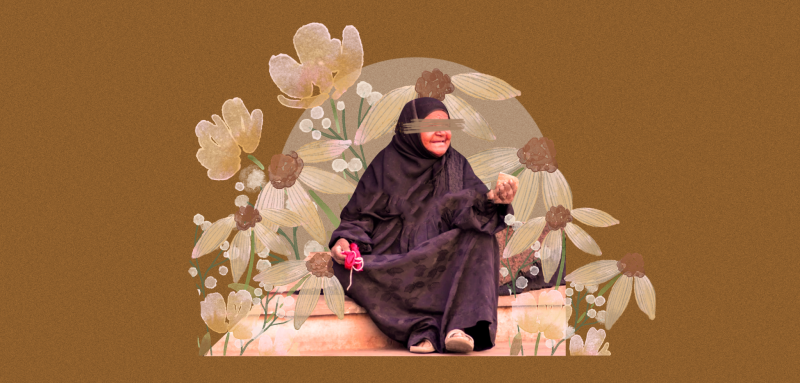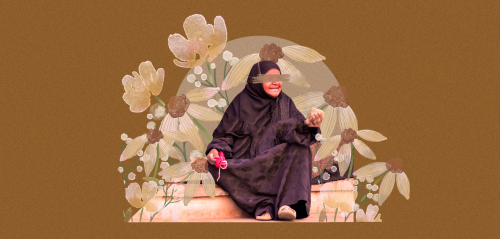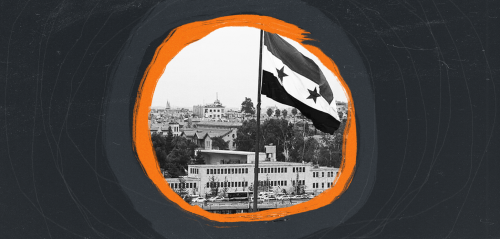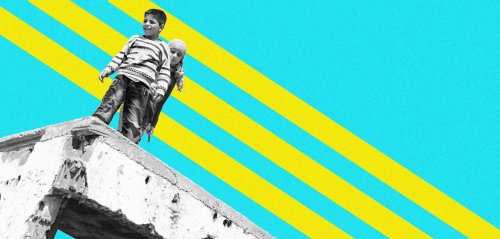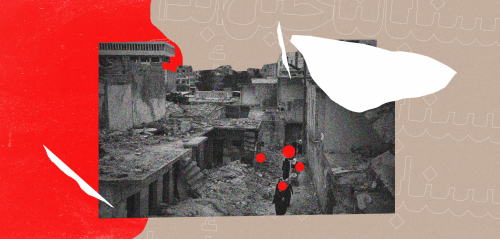Dressed in their orange suits, they hide the humiliation on their faces with scarves of varied colors. When one bent down to pick up a trash bag, a Card of Honor slipped out of her jacket pocket.
This is one in but a number of scenes of widespread oppression endured by women in Syria: mothers, wives, and widows – women who have been compensated for the loss of their lost loved ones with a ‘card of honor’ and a municipal job. These are women who have sacrificed their children for their homeland.
They stand in line at aid distribution centers for hours, just to receive a kilogram of rice and a bottle of oil.
Dressed in their orange suits, they hide the humiliation on their faces with scarves of varied colors. When one bent down to pick up a trash bag, a Card of Honor slipped out of her jacket pocket.
Sulaf, an employee where I work, stands silent as the manager scolds her every morning for arriving at work a half hour late, nodding in agreement to avoid losing her job. She desperately needs those extra thirty minutes to commute here from the bakery where she works the night shift in order to support her three children, who lost their father in the war.
Maha’s hands and feet are chafed from cleaning houses.
Ola suffers from asthma. She cannot afford the appropriate medicine on her salary attending public garage bathrooms.
Many Syrian women who have lost their family’s breadwinner now face harsh economic conditions, struggling daily to uphold a minimum standard of living and education for their children, at times forcing them to perform physically demanding tasks, previously reserved for men.
Livelihoods that eat away at our dignity
Daily scenes of hardship and stoicism among women in Syria have become commonplace since the start of the war. Peddling the fruit of her labor on the sidewalks, free from the possible exploitation of an employer, is one method to somehow preserve a woman’s dignity.
These women are considered fortunate to have obtained loans for small business projects without compromising their dignity or connections. In a country riddled by corruption, everything has a price.
Such loans enable these women to purchase a sewing machine, open a small food store, or to buy a few chickens to make a living from their products.
Many Syrian women who have lost their family’s breadwinner now face harsh economic conditions, struggling daily to uphold a minimum standard of living and education for their children, at times forcing them to perform physically demanding tasks, previously reserved for men.
Prior to the war, it was unheard of to spot a woman gathering firewood to sell in the market, or to see women working in cement and brick factories.
Women work at the Souk Al-Hal as porters, subject to the demands of male employers who show no compassion or understanding despite their often exhausted and bowed bodies.
Sulaf is silent as the manager scolds her for arriving at work a half hour late. She desperately needs those extra thirty minutes to commute here from the bakery where she works the night shift in order to support her three children, who lost their father in the war.
Men used to believe that women had no place at Souk Al-Hal (the wholesale market for vegetables and fruits), with its invasive glares and vulgar language.
Today in Syria, it is not uncommon to find a neighbor sleeping on the sidewalk of a faraway neighborhood, selling her household items and her children's clothes in order to afford their daily essentials. You might encounter another neighbor, in the darkness of the night, shielding her face from view while collecting plastic bottles and cardboard boxes from the trash.
Men used to believe that women had no place at Souk Al-Hal (the wholesale market for vegetables and fruits), with its invasive glares and vulgar language. Today, women work at the Souk as porters, subject to the demands of male employers who show them no compassion or understanding.
Some women are not physically able to work, and others have chosen easier ways to make money. Some lie on the streets with their children in their lap, begging for coins. Some lie on the streets without children, freeing them to get into the cars of passerby’s, looking to take them for a ride, one that might earn them enough to provide food for their children.
There are also the women who have sought salvation beyond this land's borders. These women sometimes leave their children in the care of relatives in order to pursue ultimately false or deceiving employment opportunities abroad. Many times, these women wind up in prostitution networks or are left stranded abroad, penniless, victims of scam and fraud.
Some women jump into marriage, seeking a haven that could turn into hell. Others get into marriages that transport them beyond the borders of this country. Syrian women have become commodities in their attempts to relieve themselves and any remaining family from extreme poverty. There has been an increase in Syrian women marrying non-Syrian Arabs, supposed knights in shining armor, rescuing Syrian brides from their hell. In the worst cases, these women fall victim to sexual slavery and exile.
And then there’s us, the female employees in government jobs, who studied tirelessly for our university degrees that our families once showed off in fancy frames on the walls of our living rooms.
A protection law sent to forced early retirement
There is a law to protect women in Syria, but it is a flimsy law, one written on a tattered sheet or paper. In the past, this law protected women (or those brave enough to speak up or fight back) from abusers, harassers, and exploiters.
In 2013, the law was revised, and the punishment for harassers, rapists, and exploiters was amended to range from life imprisonment to death. The school curriculum for children of all ages levels was also revised to incorporate and contribute to the awareness and education of students about rights and duties, and to uproot the stereotypical image of women's roles in society, with including:
Women's rights as human beings and citizens.
The right to choose and practice a profession.
The right to protection, healthcare, and nutrition.
The right to choose her own spouse.
These are phrases that every hungry Syrian child can laugh bitterly at today. There is an ancient Arabic saying, “A free woman dies before eating with her breasts.” According to this, a woman does not accept a life of ease and wealth by exploiting her body, whether lawfully or unlawfully. But every part of a Syrian woman’s body has been ravaged by tyranny and oppression — beasts who are still not satisfied.
* The views and opinions expressed in this article are those of the author’s and do not necessarily reflect the official policy or position of Raseef22
Raseef22 is a not for profit entity. Our focus is on quality journalism. Every contribution to the NasRaseef membership goes directly towards journalism production. We stand independent, not accepting corporate sponsorships, sponsored content or political funding.
Support our mission to keep Raseef22 available to all readers by clicking here!
Interested in writing with us? Check our pitch process here!
